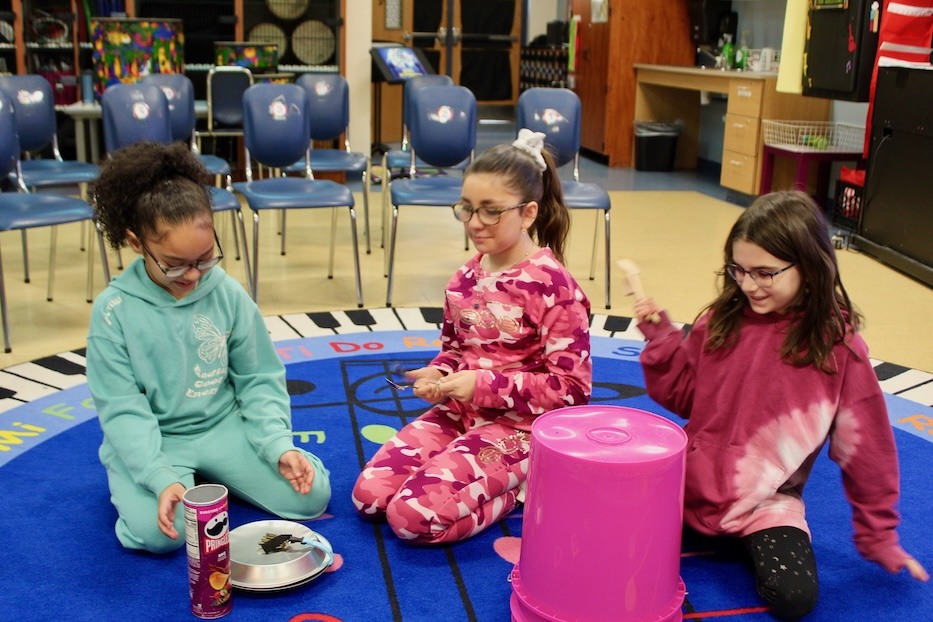
Jayla Cajigas, Sophia Consolmagno and Francine Van Campen, all third graders at Hill Central Music Academy.
Jayla Cajigas started the beat, her hands keeping time with an empty Pringles sleeve and upturned pie plate. Bah-buh-buh-buh-buh-buh. Bah-buh-buh-buh-buh-buh. "Go!" she cried, and Francine Van Campen began to tap two wooden spoons on an overturned paint bucket across from her. Just inches away, Sophia Consolmagno joined in, her cutlery doubling as percussion.
The three were among a dozen music makers Friday morning, as third graders at Hill Central Music Academy got a crash course in tempo, rhythm, beat, and dynamics from Kelly Wuzzardo, director of education and engagement at the Shubert Theatre. Held in advance of STOMP's performance at the Shubert in late May, the workshop was a reminder that music can happen anywhere, with anything, if people have the pluck and ingenuity to make it.
"The idea is that you don't have to have expensive instruments to make music," Wuzzardo said as she pulled a wagon of large, upturned plastic buckets down the school's hallway. "It's an access thing. You can have access to music all the time, and we want kids to remember that."

Kelly Wuzzardo, director of education and engagement at the Shubert Theatre.
That's especially true of STOMP, which has performed at the Shubert at least three times since Wuzzardo started at the theater in 2003. Founded in 1991, the group uses utilitarian, working-class objects—garbage cans, 30-gallon plastic drums, brooms and buckets—to make music, building soundscapes that are at once recognizable and unique. While the group was born in New York City, it has since become an international phenomenon, performing across the globe.
Friday, it was a reminder that students can make music with what they have, however un-instrumental it may initially seem. When Wuzzardo began teaching the STOMP workshops 14 years ago, she used old pie plates, lost and discarded keys, cookware, and brine-scented pickle buckets rescued from the trash. Many of those items have stuck with her—although the buckets are now clean and color-coded, thanks to funding from ASML for the theater's education programs.
Friday, she stood at the front of Hill Central's elementary music classroom, her feet planted firmly beside a round carpet decorated with musical scales and black-and-white piano keys. As students fell to a hush, she introduced the workshop with music teacher Rebecca Corbin at her side. Behind them, Corbin wrote the word rhythm in big, green letters on a smartboard.
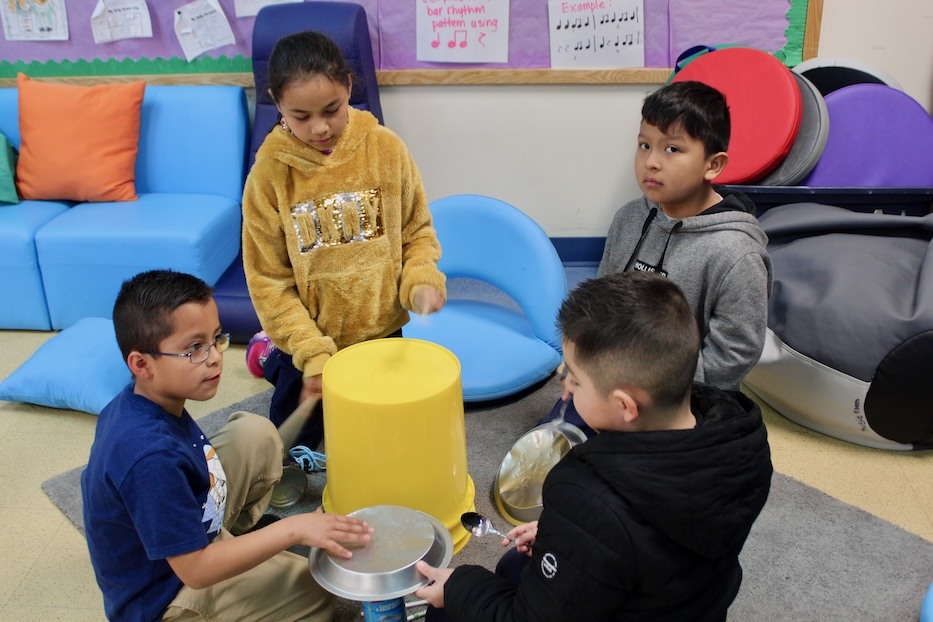
Carlos Morales, in blue, finding the tempo.
"What does rhythm mean?" Wuzzardo asked, a swish of purple hair catching students' attention. For a moment, the room was silent. Then a smattering of hands went up, all at once. She pointed to Sophia Consolmagno, a pint-sized self-described Swiftie who later played two dinner spoons as if they were castanets.
"Sound?" Sophia ventured. Wuzzardo tilted her head. It was close, she said, but not quite. She lifted her hands, and clapped out five beats, each evenly spaced. When the class responded with the same beats, she explained, that was an example of rhythm.
"What about tempo? What does tempo mean?" she asked. In the classroom, a dozen eyes looked back without a sound. Wuzzardo tried a different tack. "Or tiempo? What does tiempo mean?"
Carlos Morales' hand shot up from the second row of chairs, a gentle half circle arranged around the rug. "Time?" he said, the tone inverted enough to make it feel like a question. A smile appeared on Wuzzardo's face. "Exactly!" she said.
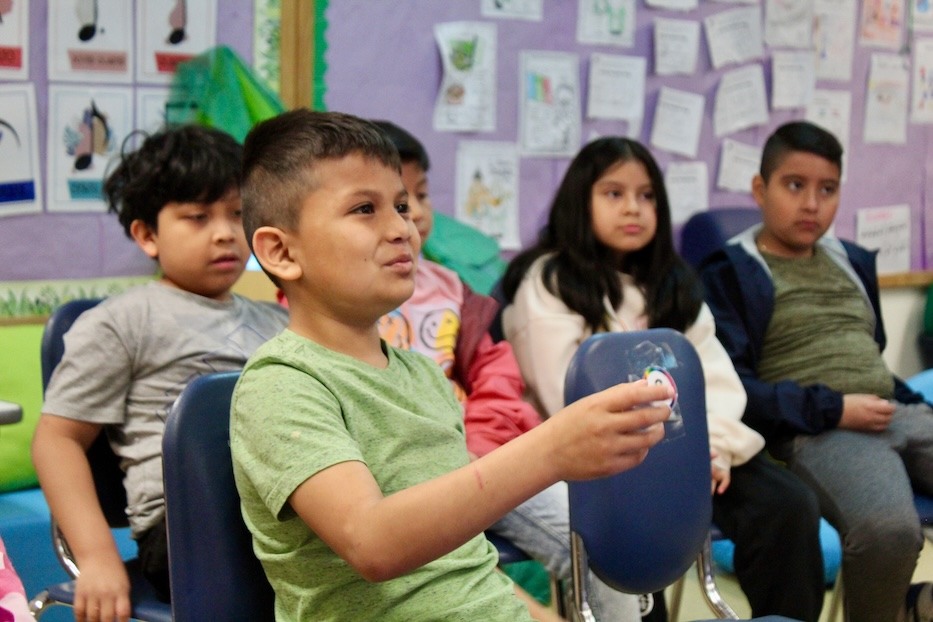
Student Anderson Zhumi, who responded to almost every question Wuzzardo threw out to the class.
She moved on to dynamics, students hanging on to every word as she raised her voice into a bellow and lowered the volume to a whisper just as quickly. Then it was go time. She explained that students would be splitting into groups, each making their own composition in 15 minutes.
"You need a beginning," she said as coffee cans, metal and wooden spoons, large plastic buckets and empty sleeves of barbecue Pringles appeared around the room. "You need a middle. And you need an end."
In a group at the center of the room, Jayla, Sophia, and Francine got to work. Hammering out a three-seven-three beat with her Pringles can, Jayla listened, looked up thoughtfully at the ceiling, and then scaled it back.
"We're trying to make a rhythm that kind of makes sense," she said. She tried out a beginning that Francine responded to immediately, and decided that it stuck. "So what we're thinking is that we have to do everything together—"
"Like beats!" Sophia jumped in. Then directing her attention to Francine: "She should go second!"
The three went back to the beginning, a pair of keys jingling in between two aluminum pie plates that Jayla had steadied with her right hand. They tailored the rhythm, turning the opening from a three-seven-three pattern to five beats that each musician echoed. As she listened back, mulling it over in real time, Sophia considered a nearby coffee can, its ridges enough to make it into an impromptu güiro.
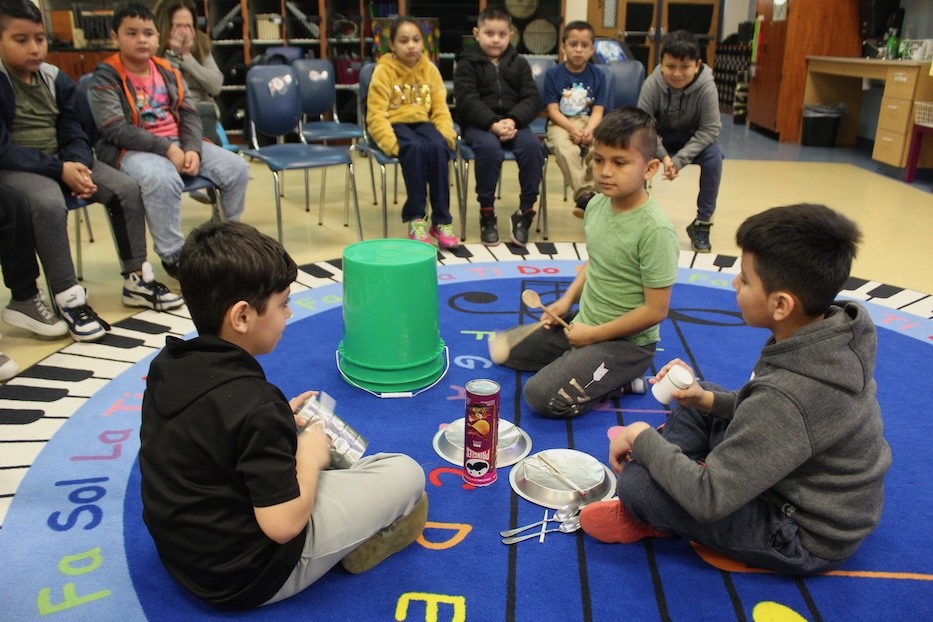
In what seemed like minutes, they were performing for the class. As Jayla sounded out five beats, her eyes traveled to Francine, the bucket soon part of the beat. In the center, Sophia knocked her spoons together, gentle but insistent. Then at 19 seconds, they bowed their heads, crawled forward, and all beat the bucket drum with their respective instruments. No sooner had they finished than their classmates burst into applause.
"I heard an awesome rhythm," Wuzzardo said. "What did they do well?"
Alice Damian raised her hand, two tiny Puerto Rican flags dangling from her ears. "When they put the spoons together," she said. She noted how Jayla, who started the musicians off, had given a verbal cue for her peers to join in. "My favorite thing is when we make sound and it gets bigger and bigger."
Wuzzardo nodded. "It's really important as a group to listen to each other, right?" she later added, and she could have been speaking to the whole school "An important part of being a musician is working together and supporting each other while you do it."
And for the remainder of the class, students did. Classmates cheered, giggled and clapped when Anderson Zhumi tossed a wooden spoon up in the air, and caught it as a finale to the piece. They admired the call-and-response rhythms of students gathered around a red bucket-turned-drum.
They jammed in their seats as Sofia Namuche and John Luna turned kitchen utensils into instruments worthy of Carnegie Hall. By the end, they seemed hesitant to part with their instruments and newfound bandmates.
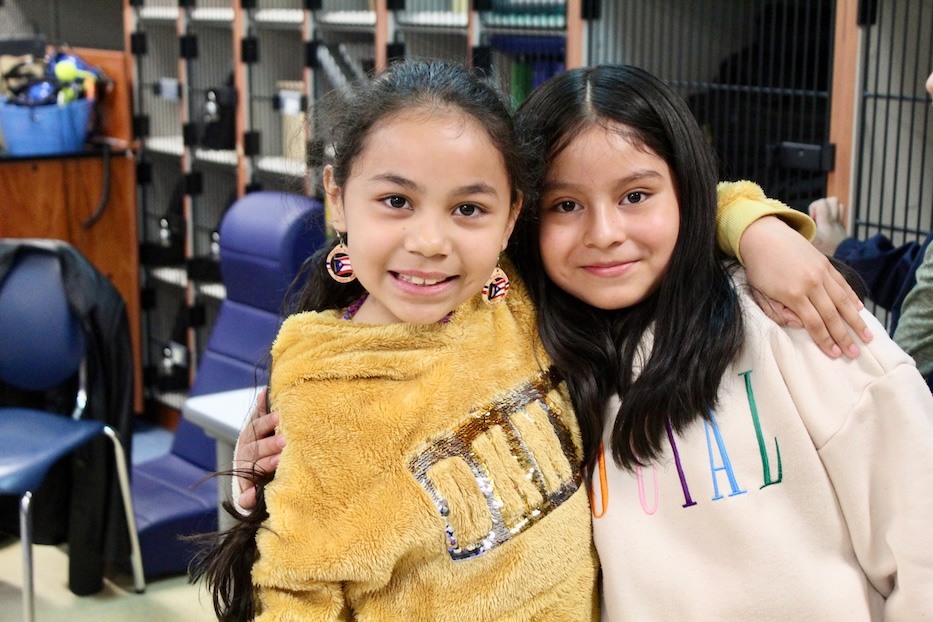
Alici Damian and Sofia Namuche.
"You all did an excellent job!" Wuzzardo said. "I have one last question for you. What's the difference between music and noise?"
"There's a pattern!" ventured John. "It's not distracting."
Wuzzardo seemed to chew on the words for a moment, and then spoke again. "I want you to listen for the music in your world," she said. It could show up anywhere, she continued, from birds chirping to the sound of motorcycles revving their engines on a city street. "It is all around you."
STOMP will perform at the Shubert Theatre May 31 through June 1. Tickets and more information are available here; the theater has a reduced cost ticket program for all public high school students. On May 11, Wuzzardo will host a final STOMP workshop for families at the Stetson Branch of the New Haven Free Public Library.